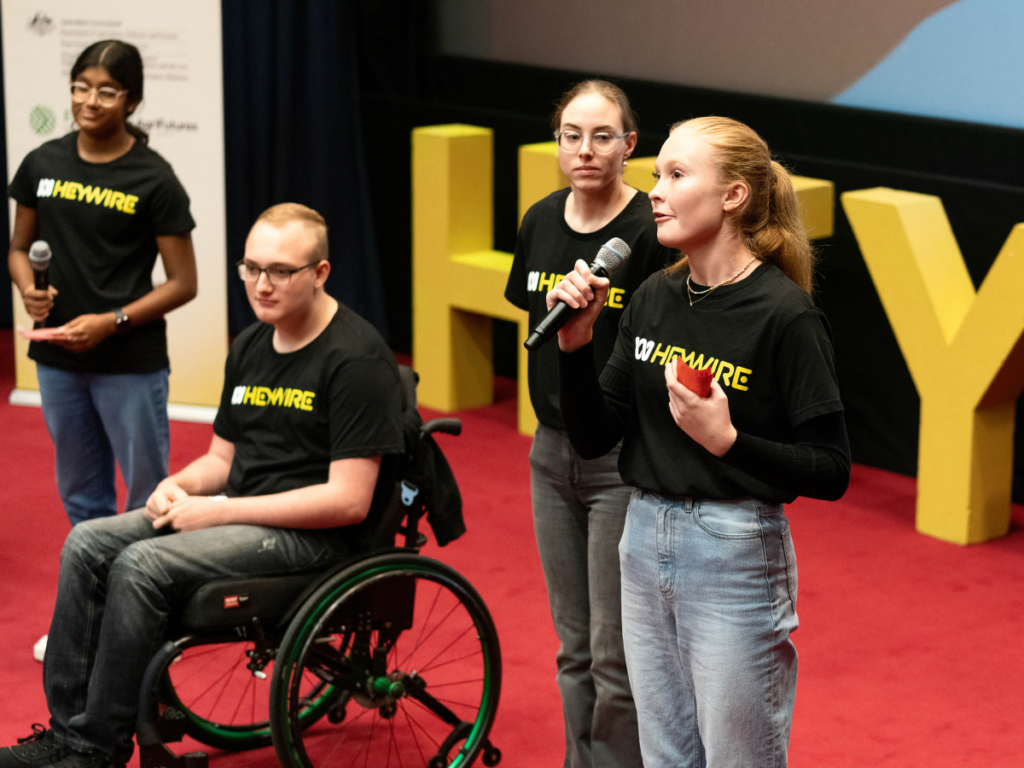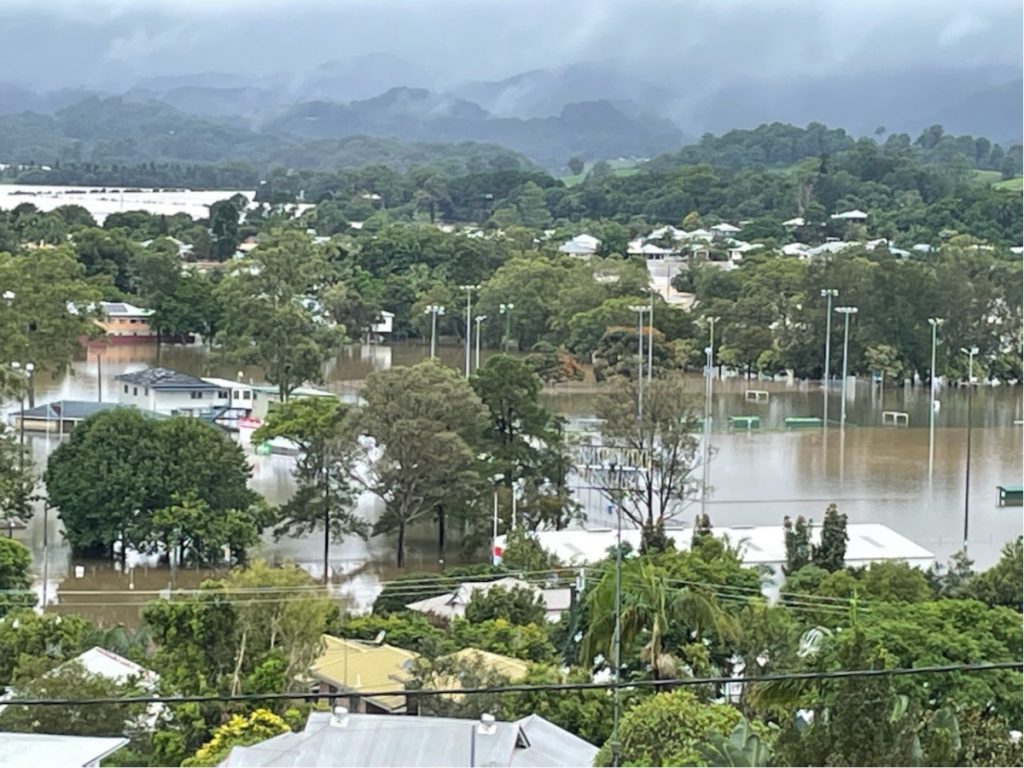Foundation for Rural & Regional Renewal (FRRR)
Sixteen community initiatives that will act on issues that matter to remote, rural and regional youth will share in $148,721 in grants, through the FRRR ABC Heywire Youth Innovation Grants program.

Now in its 11th year, the youth-focused program offers funds for communities to adopt, adapt and act on the ideas generated by young Australians at the ABC Heywire program’s annual Regional Youth Summit.
This year’s 39 young Summit participants developed six exciting ideas for change on issues that matter most to rural youth, with themes addressing boredom relief; easy access to mental health support; cost of food relief; education and diverse learning needs being catered for; ensuring youth voices are heard; and creating better futures for young people with disabilities.
The idea that received most applications was ‘Boredom Relief’, which resonated extensively with young people. One of the projects receiving funding to respond to Boredom Relief will be led by 2023 Heywirer Blake, who says there is a lack of opportunities for fun youth events in rural communities such as his.
“In small rural towns, it can feel like there is nothing for young people to do. We need to make sure that there are safe events and spaces for youth, or else they will look to drugs and alcohol for entertainment and excitement.
“Our project will see young people design and lead a one-day event of live music and activities. The drug and alcohol-free event will involve young and upcoming artists, and include art and cultural activities. I know it will help the young people in our community to build connections and give them practical experience in event management.
“I’m excited for it to get underway!” Blake said.
Deb Samuels, FRRR’s People Portfolio Lead, said that this program helps to put youth-led ideas at the forefront of rural communities and helps young people to feel heard.
“Young people are the future and often we find that grassroots organisations know how important it is to involve the youth and make them part of the community, but they simply lack the capacity to do so.
“Thanks to our donor partners, this program gives community groups the support and resources they need to overcome these barriers and focus their time and energy on initiatives that will make young people feel seen and empowered.
ABC Director, News, Justin Stevens, thanked FRRR for its support.
“Heywire amplifies young rural and regional voices across our ABC platforms and the Regional Youth Summit encourages their inspiring ideas for change and helps bring them to life,” he said.
“These young innovators are Australia’s future leaders and their ideas demonstrate their understanding of what their communities need.”
Examples of this year’s projects include:
- Zero Positive for Schools in Scone, NSW received $6,200 to develop the Idea 4 Change idea by preventing climate anxiety for youth with a summit featuring youth environmentalists and support for implementing school-based action plans.
- Nganmarriyanga School in Nganmarriyanga, NT, received $10,000 to develop the Boredom Relief idea by fostering youth agency and responsibility with the opportunity for youth to design their own Boredom Relief project.
- Breakaway Toowoomba in Toowoomba, QLD, received $10,000 to develop the We Are Not Alone idea by encouraging greater visibility of disability with a youth-led accessible community event to establish support networks.
- Tomorrow Movement in TAS (statewide), received $10,000 to develop the Hear Our Voices idea by preparing youth to become leaders of community-driven climate solutions with workshops to develop skills in facilitation and visioning sessions.
- Birchip Neighbourhood House Inc in Birchip, VIC, received $10,000 to develop the Boredom Relief idea by empowering youth with skills in event management through the delivery of a youth-led arts and culture event.
- Kununurra Community Garden Kitchen in Ringer Soak, WA, received $10,000 to develop the Homegrown Hub idea by growing cultural education on Indigenous plants and increasing access to food security with the installation of a community kitchen garden.
These grants are possible thanks to the generous support of The Sally Foundation, David Mactaggart Foundation, The John Villiers Trust, AMP Foundation, as well as several private donors.
The full list of grant recipients and their projects are below.
| Organisation | Project | Location | Grant | |||
|---|---|---|---|---|---|---|
| NEW SOUTH WALES | ||||||
| Barkindji Maraura Elders Environment Team | Boredom Relief Strengthen community connections and wellbeing with on-Country camps for youth. | Dareton | $10,000 | |||
| Grand Pacific Health Limited | Boredom Relief Enhance a youth-led music festival to provide opportunities for young people to engage in their community. | Pambula Beach | $9,265 | |||
| Zero Positive for Schools | Idea 4 Change Prevent climate anxiety for youth with a summit featuring youth environmentalists and support for implementing school-based action plans. | Scone | $6,200 | |||
| NORTHERN TERRITORY | ||||||
| Nganmarriyanga School | Boredom Relief Foster youth agency and responsibility with the opportunity for youth to design their own Boredom Relief project. | Nganmarriyanga | $10,000 | |||
| QUEENSLAND | ||||||
| Breakaway Toowoomba | We Are Not Alone Encourage greater visibility of disability with a youth-led accessible community event to establish support networks. | Toowoomba | $10,000 | |||
| Bridges Health and Community Care Ltd | Easy Access Equip students with strategies to improve wellbeing and navigate difficult conversations through mental health education delivered through theatre. | Monto | $5,500 | |||
| Coen Region Aboriginal Corporation | Boredom Relief Encourage youth and the community to come together at a series of outdoor movie events. | Coen | $10,000 | |||
| Now I Can Run | We Are Not Alone Encourage wellbeing and physical activity with an event to introduce race running to youth with mobility impairments. | Townsville | $9,700 | |||
| Puuya Foundation | Easy Access Strengthen youth wellbeing with on-Country camps that provide culturally appropriate mental health supports. | Lockhart River | $10,000 | |||
| TASMANIA | ||||||
| Kind Schools Limited | Idea 4 Change Foster resilience and kindness in children through mental health training for primary students. | Invermay | $10,000 | |||
| Tomorrow Movement | Hear Our Voices Prepare youth to become leaders of community-driven climate solutions with workshops to develop skills in facilitation and visioning sessions. | Statewide | $10,000 | |||
| VICTORIA | ||||||
| Bendigo Sustainability Group | Hear Our Voices Support youth skills in creative and community advocacy with workshops to develop a digital-storytelling program. | Bendigo | $9,500 | |||
| Birchip Neighbourhood House Inc | Boredom Relief Empower youth with skills in event management through the delivery of a youth-led arts and culture event. | Birchip | $10,000 | |||
| Creswick Neighbourhood Centre Inc | Boredom Relief Create a youth space to reduce isolation and improve mental health for local youth to come together. | Creswick | $10,000 | |||
| Standing Tall in Hamilton | We Are Not Alone Support mentors to become more confident and capable of working with disabled young people with youth-led access and inclusion training. | Hamilton | $8,556 | |||
| WESTERN AUSTRALIA | ||||||
| Kununurra Community Garden Kitchen | Homegrown Hub Grow cultural education on Indigenous plants and increase access to food security with the installation of a community kitchen garden. | Ringer Soak | $10,000 | |||
Nearly $750,000 committed but more needed
Nearly $750,000 has been committed to FRRR’s Flood Recovery Appeal, launched last week, thanks to generous contributions and promotion from donor partners including AMP Foundation, Frasers Property Foundation, Stockland CARE Foundation, Suncorp and Wilson Asset Management, as well as many other private and individual supporters.

However, FRRR is continuing to seek further donations to meet the recovery needs of the growing number of communities outside metro regions that will require support well into the future. This includes the unfolding disaster in Queensland and New South Wales, as well as areas that have already experienced severe flooding.
Natalie Egleton, CEO of FRRR, said that the Foundation has already seen local people mobilising, with information being shared via community-based networks and, where waters are receding, local people are already looking ahead to what’s going to be needed.
“It’s hard to understate the impacts of these floods, which in many places follow years of drought, bushfires, COVID restrictions, and previous floods – and from which many are still recovering. The social and economic impact on many rural communities will be severe.
“Communities will have different concerns and needs, so recovery will happen at different rates, depending on the community and local priorities. Our focus is to make sure that once local leaders identify what their recovery needs are, there is support available.
“FRRR’s strong networks and relationships with community groups and not-for-profits in impacted areas, coupled with programs already in place, mean we will be ready to offer support when they are ready.
“Donations to our Flood Recovery Appeal will help to fund a diverse range of initiatives. That could be rebuilding infrastructure, supporting vulnerable community members, addressing the overall mental health of locals, providing opportunities for locals to reconnect and share their experiences, or improving resilience for future disasters,” Ms Egleton explained.
People can support FRRR’s Flood Recovery Appeal by donating to either the Disaster Resilience and Recovery Fund or the Strengthening Rural Communities program.
Donations to the Disaster Resilience and Recovery Fund are pooled and invested to ensure that remote, rural and regional communities affected by natural disasters can access flexible, fit-for-purpose funding to support local preparedness and recovery efforts, when it’s needed.
Alternatively, donations can be made to FRRR’s Strengthening Rural Communities program, with FRRR making grants to support community organisations in these flood-impacted regions.
FRRR has supported remote, rural and regional communities across the country prepare for and recover from natural disasters since 2006. To date, FRRR has distributed more than $40 million for community-led disaster recovery and resilience initiatives, including more than $7 million for projects supporting recovery from the 2019-20 bushfires.
To donate to FRRR’s Flood Recovery Appeal visit – https://frrr.org.au/giving/flood-recovery-appeal/

